6-1-24
Through a Lens Darkly:
Africa Star by Adonis Florides Shines at the LAGFF
By Diane Sippl
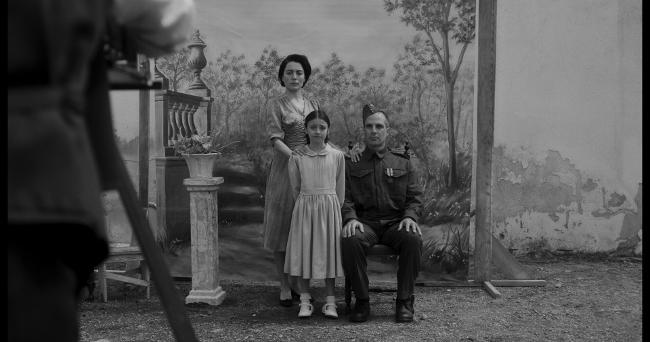
There’s something awful about a lost picture. Maybe it’s because of a disparity between your original hope and the result: you made the photograph because you intended to keep it, and now that intention—artistic, memorial, historical—is fugitive, on the run toward ends other than your own. The picture, gone forever, possibly revived by strange eyes, will never again mean quite what you thought it would.
Vinson Cunningham, “Photo Realism: Moisés Kaufman’s Here There Are Blueberries”
in The New Yorker, May 27, 2024
Do you know Zeno of Elea? Motion is nothing but an illusion. The belief in change is mistaken. There is no motion. Paradox. Paradox, a Greek word. You have no idea what I’m talking about.
British Captain “Bully Beef,” Africa Star
“I have no desire to learn what happened,” claims a daughter in 2008. “All I know is that my mother died giving birth.”
“I don’t remember. I don’t want to remember,” insists her mother in 1967. “I was left by my mother waiting under the carob tree.”
And yet each of these women carries with her, through all her days, a precious photograph, the same one. It was arranged with some effort by the original mother in 1945, an attempt to document, honor, even celebrate the fact that three people were reunited: mother, daughter, and husband. In some ways, Adonis Florides’ film, Africa Star is the story of that photograph, a carefully composed black and white image of a family as it hardly existed, a wish and a hope on the part of Plumu from Cyprus as she fought for her family’s survival even long after it was said the war had “ended.”
In his recent review of a play at the New York Theatre Workshop, a drama that traverses the same years as Africa Star and also concerns itself with what remains unseen in history, Vinson Cunningham writes,
… a photograph is a quivering, ambivalent, sometimes deceptive form of evidence…. You can suss out mood and tone, discern planetary facts like weather and time of day. But the spaces between exposures, before and after the questioning begins—who knows?
Adonis Florides employs another art—cinema—to enable us to reconstruct what has transpired in the “spaces between exposures” (or on our screen, separate gazes at the photograph) across more than 60 years. Early on we see that even mood and tone might deceive us in this family relic. Why? We can ponder the precarious power of photography by posing a paradoxical riddle: What brings a loyal wife to barter her body, a newly released soldier to commit murder, and a devoted neighbor to steal from the woman he loves?
Africa Star, exploring three generations of women in Cyprus, delves into these questions and more as a theatrical feature showcased (among documentaries) in “A Cinematic Tribute to Cyprus” on June 4 from 5:00 to 10:00 pm at St. Sophia Huntington Center, 1324 So. Normandie Ave., Los Angeles 90006. The film is presented as a mid-festival highlight of the 18th Los Angeles Greek Film Festival (LAGFF), June 1-8, 2024. For this occasion, it’s a pleasure to provide the following interview with the writer-director of Africa Star, Adonis Florides, who provides some important historical context for his film and discusses its themes, characters, and conflicts with extra commentary on narrative genres and the relation between cinema and theatre.
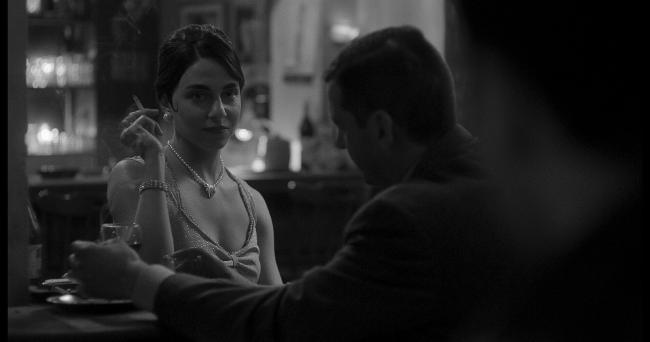
Historical Context and Character Background
KC You choose the dates of 2008, 1967, and 1945 for focus. Can you elaborate (maybe even on how these dates resonate with problems in the region today)?
AF This film is inspired by stories that went around in my extended family for many years and have been imprinted in my mind and soul since childhood. It was not my intention to recreate actual events or to reconstruct the physical reality of those times, but rather to create a psychological reality in which the viewer can participate. I chose these dates to suit the narrative.
The film follows the struggles of three women of three different generations, mother, daughter and granddaughter, set in three different periods of the recent history of Cyprus.
In 1945 at the end of WW2, Cyprus was still a British colony. Some 30,000 Cypriots served with the British during WW2, especially in the Cyprus Regiment in France, North Africa, Ethiopia and Italy. More were enlisted directly into the British Army, Royal Navy and RAF, and many others fought with the partizans in Greece against the Nazis. Most of them joined out of financial necessity. It is not very well known, but during the war several thousands of Cypriots, from both the Greek and the Turkish communities, joined the British Army (as my character Yiakoumis did) and served primarily in the Desert War and the Italian front, mostly with the Cyprus Regiment. My grandfather served in North Africa and Italy in the 8th Army. When he came back. he was not the same person. While he was absent, his family suffered a lot. My grandmother and her children lived in absolute poverty for some period. The Africa Star is a campaign medal that was awarded to all veterans of the Desert War who were part of the British 8th Army in the Middle East. So 1945 represents, if I can say so, the colonial period.
In 1967 Cyprus was in a transitional period, independence before the Turkish invasion but after the intercommunal troubles of 1963. Just three years after its independence in 1960, intercommunal troubles erupted between the Greek (GC) and the Turkish Cypriot (TC) communities. This resulted in the separation of the two main communities, and most Turkish Cypriots lived in numerous enclaves under the protection of the UN. Those Turkish-Cypriots who remained on the “wrong” side were continuously pressured by both their “own” and the “enemy” to move to the enclaves. This was the first geographical division of the island along ethnic lines. This is also a not-well-known fact. My character Jenny is a TC who remained in the GC sector and has to choose sides, whether to go live in an enclave or stay in the GC side. Wherever she goes, she has no chance. The character Eugenios is a GC who protects her despite being a pimp himself. As in many cases, GCs and TCs spoke both languages. Usually the minority spoke the language of the majority.
2008 represents Cyprus today, which has been geographically divided since 1974 with both communities living completely separately in two distinct geographical areas. Nevertheless, I chose these particular dates mainly for dramaturgical reasons rather than historic ones.
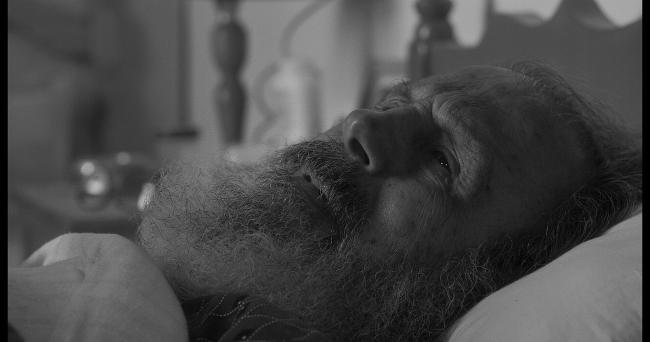
KC Are all of your characters (except the British officer) Greek Cypriots?
AF All the characters in the film are Greek-Cypriots, with three exceptions. Jenny (whose real name is Jemalie) is a Turkish-Cypriot living in the Greek sector and whom the Lazaros gang wants to get rid of. As the guy says: Christians have to be with Christians and Turks with Turks. This is a comment on the interconnections between the mafia world and pseudo-patriotism. Jenny says only one sentence in Turkish. She is at a dead end: she cannot go to the Turkish sector because she was “collaborating” with GCs (Eugene) and she can’t stay in the Greek sector because she is threatened by the Lazaros gang and Eugene cannot “protect” her any more.
Captain “Bully Beef” is a corrupt British officer during the British colonial period at the end of WW2. He is a kind of racketeer who steals army property and sells it in the black market. Bully beef is his specialty.
Vangelis is a Greek soldier from Greece doing his military service in Cyprus in 1967 as part of the Greek contingent. He speaks with a Greek accent while Litsa/Vasilou talks to him in a Cypriot Greek accent (they sound very different to a non-Greek-speaker).
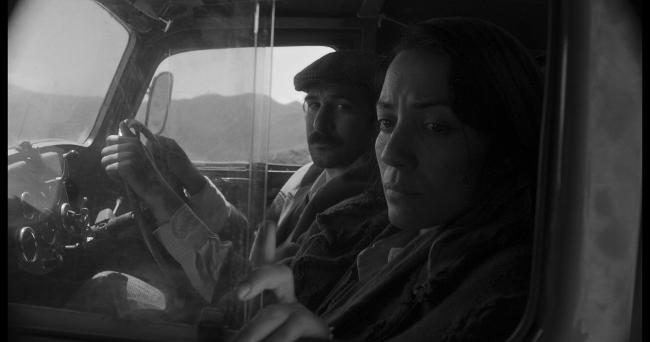
Aesthetics
KC Africa Star is shot in black and white. Furthermore, its conflicts seem to be black and white—physical, social, and emotional battles between exploiters/abusers and their victims. Did you always visualize your film in black and white images?
AF Yes. Since my childhood, these stories have been imprinted in my mind in black and white. It was impossible to envision them in colour. Also, for many years in the 1960s, on our TV set at home we saw black and white; all my family photos, even many photos of myself as a child, are in black and white. All these contributed to my decision to shoot this film in black and white. I couldn’t, and I still can’t, see colour in these images.
Having said that, the term “black and white” is not really accurate. In reality we have a lot of different shades of grey in all levels of conflict—physical, emotional and social. Although there are exceptions, like in the case of the Muhtar, the main characters of the film seem to move from a lighter shade of grey to a darker one and vice-versa. As an example, Plumu tries to get rid of the dead body of the Muhtar to save herself and her family. At the same time, this is ethically questionable and certainly complicity to a crime and she knows it. She moves from the lighter shade of grey to a darker one. But we empathize with her, even though we know what she is doing is wrong.
And here comes the question: when is it ethically correct to act illegally? Can such a situation exist? Is our suffering in extreme poverty and our desire for dignity enough reason? We can find similar examples of characters moving from a darker shade of grey to lighter ones or vice-versa, such as Eugene, who is an exploiter/abuser but protects Jenny from the nationalist pimps who want to get rid of the Turks, or Zeno, who is a good man but cannot resist the temptation to steal the money. And then he immediately feels bad about it and spends his whole life trying to rectify his mistake.
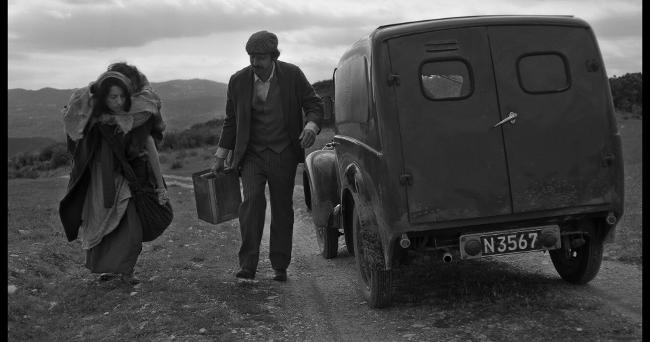
KC The film certainly calls to mind some of the codes of melodrama (especially in the segments with Plumu and all her heightened challenges of trying to hold a family together but becoming a victim—of the Muhtar, of her “friendly” neighbor, and of her husband as well). I also see the codes of film noir (especially in the segments with Vasilou, who in all her screen time, from beginning to end, is outside the confines of the home and conventional mores). Yet I can’t help but view your storytelling as a kind of fairy tale, in the strict tradition of the dark European ones. Pure evil is lurking around every corner, manifest on so many fronts, and good cannot conquer it, yet we root for the underdog. Of course, this is poetic filmmaking: your incredibly sensitive development of the family photograph, of money, of an egg, and especially the Africa Star as ironic images and symbols. Do you strive to steer clear of genres, or did you have a fairy tale purpose in mind for today’s audiences?
AF Yes, I intended to tell a dark fairy tale. This is how all these family stories sounded in my ears for many decades—as dark fairy tales. The different physical, social, and emotional environments in which the three stories unfold inevitably led to the use of different cinematic codes. I thought a lot about it, and it was a difficult but conscious decision. On one hand, I am not particularly interested in “genre” theory—although I enjoy many “genre” films; on the other hand, I was brought up with melodrama, film noir and spaghetti westerns. It wasn’t a conscious effort to steer clear of genres, but rather an effort to use the cinematic codes of various genres that would better suit the narration in a way that integrated them into one fairy tale.
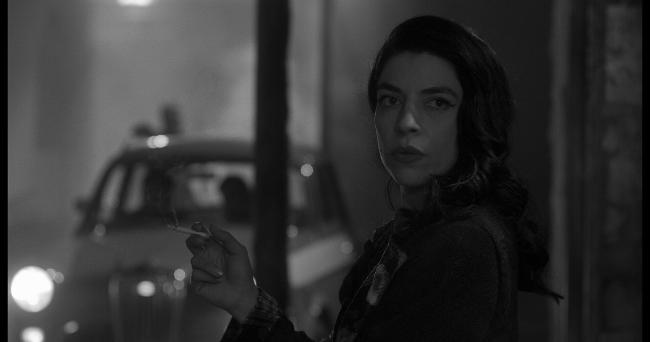
Themes
KC Subjected to men’s wars (imperialist expansion, invasions, occupation, and oppression) your women are economic victims, and they are preyed upon under patriarchy as well, so they have little chance of escaping poverty or gaining power—and yet all four of them are independent, resistant, proud, and honorable. They project dignity and composure, as in the iconic photograph, where Plumu is the one standing, not her husband, who is seated, and she has one hand on him and one on her daughter, as if she is the guardian of both. In fact, poor as the women are, they all reject the money offered (not for sex but for blackmail, emotional bribery, guilt reduction). We so often see money handled in the film—close-ups of hands counting it, packing it, storing it, giving it, giving it back, tossing it. How big a role did money play in conceiving of your story and your images? Your women?
AF It is my firm conviction that poverty is violence. Descending the stairs of a strictly hierarchical society, on the last rung of poverty and exploitation we will almost always find a woman. For the female characters in the film, the role of money is about satisfying basic material needs. The satisfaction of material needs is related to dignity. These women do not want to have money for the sake of the power that brings them. What they want is their dignity as human beings. To take a family picture in Sunday clothes, to escape certain death, to live a decent life somewhere far from the hell in which circumstances forced them to live, to tell the man who lived a life of guilt for an act he did in his youth that some things cannot be remedied. Yes, it is a moral attitude of these women. For the male characters of the film, money is the means for power and exploitation of others.
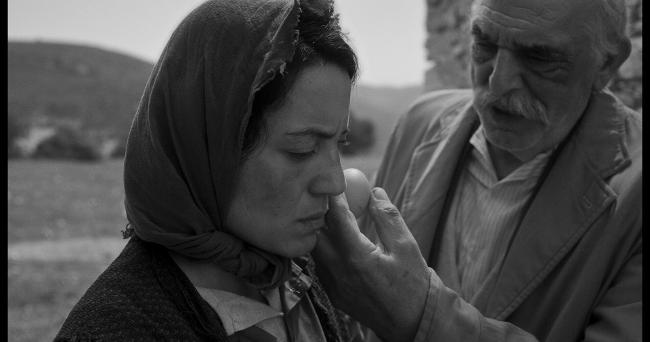
KC Your film is also very physically violent. Yet we hardly ever see these actions—they are at the edge of the frame, or just off-screen, or we see the perpetrator and not the receiver. As a dramatist and as a filmmaker, how do you view violence in our world today, and what do you see as your responsibility in portraying it?
AF What is left out of a film is sometimes more important than what is shown on the screen. Descriptively presenting violence can shock the viewer. It may even give him aversion. But it is a momentary feeling. By letting what is happening be understood rather than showing it, you invite the viewer to participate in the cinematic process. He will have to fill in what is missing by editing the images within his mind. The issue is not the representation of physical reality but the creation of a psychological reality in which the viewer can function. The ancient Greek dramatists knew very well how this process worked. Medea doesn't kill her children on stage. The spectator has to imagine what happened backstage when she reappears with blood on her hands.
KC What was your intention in portraying the granddaughter Christina as someone who doesn’t want to know about her family? All she knows is that her mother died giving birth—is that a reason not to want to know more? Does the character speak for Cypriots today?
AF Many people either don't want to know things from the past that make them uncomfortable, or they misrepresent the past in a way that makes them feel good about themselves. They are in a state of denial. They would rather not know than learn something that would disrupt their perception of their existence. Litsa/Vasilou behaves similarly when she meets Zeno for the first time as an adult. “I don’t know, I don’t want to know” she says. On a metaphorical level, this could also apply to Greek Cypriot society.
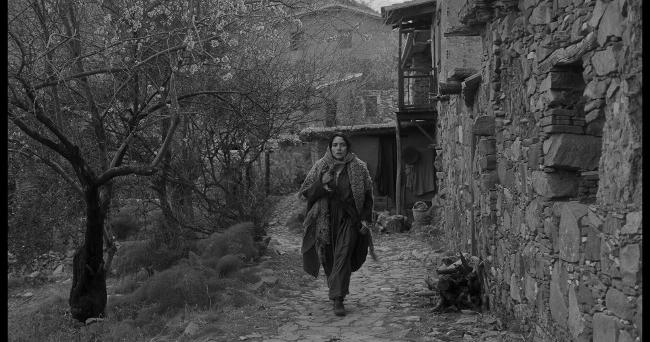
Characters
KC Do the names of the characters have any special meanings?
AF The name “Plumu” comes from a verb that means “to spruce” or “to decorate”; it is related to the Latin “pluma,” which means “feather.” Since feathers were used to decorate things, the verb in Greek ended up meaning “to decorate.” So “Plumu” means something like “the decorated one.” There was no particular reason to use this name other than it is a very old name and out of use by now and because I like it.
Jenny’s real name is Jemalie. This is a rather abstract tribute to the first person who died during the intercommunal troubles in 1963.
Zeno is a common name in Cyprus, since the philosopher Zeno the Stoic was a Cypriot. In the film, Zeno has no idea what his name represents, something the white European colonial British officer knows. Zeno only cares about how to save his small business.
KC Zeno is a curious character for me. He seems to love Plumu and to betray her at the same time. He is the one character whose motives appear ambiguous to me. Does he mean to steal, or to keep the money and photo and war relic in safe hands when he knows the Muhtar’s family will attack? Is he viciously jealous of Yiakoumis? At the very least, he seems to have second thoughts and to try to return the money, or to rescue Plumu and Vasilou in their crisis moment. Is he a kind of “spy” for the British—i.e., a genuinely fickle or coercible character compared to the women? With his ambivalence, does he represent modern Cypriots?
AF Zeno is a good man who succumbs to the temptation of money. No man is perfect. Although he repents immediately for his action, he does not have time, and this act will cost him a life of guilt in trying to return the money. This is his real punishment. I think Dostoevsky analyzes this very well in Crime and Punishment. He's not a black-and-white character either. It has its dark moments. Yes, he is a kind of “spy” for the corrupt English officer, the latter being a racketeer who steals supplies from the army and illegally funnels them into the black market. Zeno gives him information about what is happening in the black-market circuit. In other words, Zeno dos not cooperate with the British authorities, but with the racketeering ring where Yakoumis is the “smallest fish” and the British officer is the head of the ring.
Zeno loves Plumu and secretly hopes that Yakoumis will not return. He expresses it in an indirect way in different moments of the film. Even when Yakoumis returns, Zeno is still hopeful. He asks Plumu if she loves him. Her answer is: “He's my husband.” This kills his hope of winning her and determines his subsequent actions.
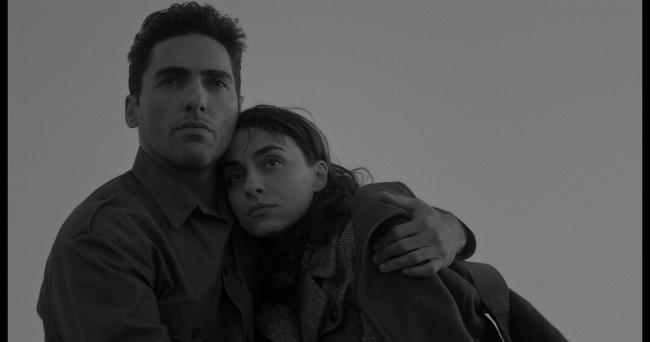
KC Why is Vasilou mute as a child? What causes her to talk? Is her utterance innocent? Is it the first instance of her naïveté that never leaves her?
AF It is a case of childhood speech delay that can be caused by a variety of reasons. These can be physical or psychological. The absence of the father has probably something to do with this.
KC What do Eugene and Jenny know about Vangelis that Vasilou doesn’t—and why?
AF Eugene, like any pimp, does not want his "women" to fall in love with “clients”. Jenny wants to protect her. She knows that these soldiers who come from far away are taking advantage of their situation and fooling them. Then they disappear.
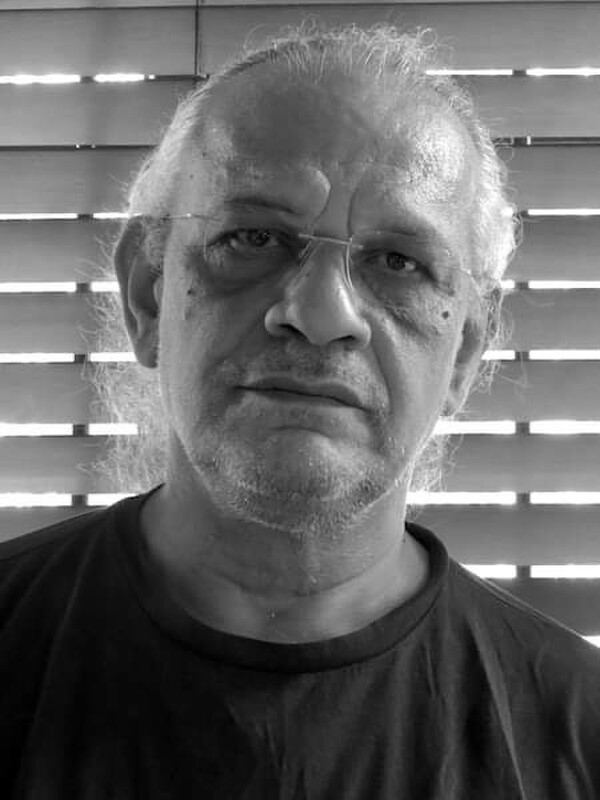
The Arts in Cyprus
KC You work in the theatre in Cyprus as well as in cinema. Do you see them each playing different roles for the culture? Do you see yourself working differently in each capacity? Which of these two arts has a stronger presence in Cyprus today?
AF We could talk for hours about the relationship between cinema and theatre; about their many commonalities, but above all about their many differences. The biggest difference though, is the fact that theatre is a live and ever-changing art form while film is recorded, and thus stays the same every time. Theatre is live, the communication with the audience is direct, every performance is different no matter how much the director tries to always have the same result. Cinema is a form of recording art; the director has total control over what happens every time on the screen and the viewer sees the same film every time. Communication is not direct; it is indirect. This is the main difference and for this reason they have different functions. Cinema is the art form that encompasses all other art forms, its codes are more complex than those of theatre, and it is, if I may say so, more manipulative in the sense that it is the director who will direct the eye of the viewer to the detail she wants. In theory, theatre, especially in some of its forms, is a more “democratic” as a medium in the sense that the viewer has more freedom to choose what detail to attach importance to.
KC Can you tell something about the film you are in the midst of shooting right now?
AF This time I am going back to 1963. The start of the intercommunal troubles in Cyprus on Christmas Eve. A family finds itself trapped inside its house between the two fighting sides.
KC Well thank you for your elaborate commentary and insights. Here’s hoping to see your next opus at the 2025 LAGFF!
Africa Star
Producers: Marios Piperides, Janine Teerling; Director: Adonis Florides; Screenplay: Adonis Florides; Cinematography: Giorgos Rahmatoulin; Editing: Stylianos Constantinou; Set Design: Andreas Antoniou; Music: Antonis Antoniou; Sound: Stavros Terlikkas; Costume Design: Lakis Genethlis; Makeup: Giorgos Vavanos; Hair: Marios Neofytou; Casting: Eleni Nicolaou; Production Manager: Zenon Hajdipavlou.
Cast: Marina Makri, Loukia Vasileiou, Yiolanda Christodoulou, Elena Kallinikou, Neofytos Neofytou, Giorgos Anagiotos, Giorgos Evagorou, Grigoria Greco-Chrisofidi, Charalambos Charalambous, Alexandros Martides, Stelios Andronikou
107 min., B/W. In Greek with English subtitles.
Adonis Florides is a Cypriot writer/director for film, TV and theatre. His feature films include Rosemarie and Kalabush. He has directed numerous theatre plays, including his own original work as well as work from the Greek, Cypriot and international repertoire. He has served as Chairman of the Board of the Cyprus Directors' Association and is a member of the board of "RIALTO THEATRE.”